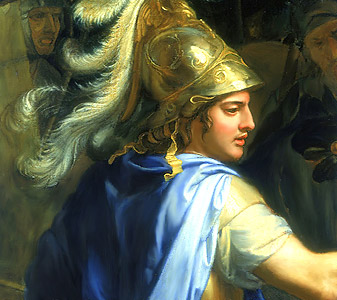 Effects of Alexander`s invasion have been over or under emphasized. Some writers believe that it had no effects as such. In fact the writers ascertain that no trace of invasion remained.
Effects of Alexander`s invasion have been over or under emphasized. Some writers believe that it had no effects as such. In fact the writers ascertain that no trace of invasion remained.
The effects of the invasion are as follows:
* The routes used by Alexander became trade routes between India and the West. He opened a sea route to the West.
* Alexander brought with him several historians and scientists. These people recorded lot of details about the Indian society.
* The Gandhara School of art is influenced by the Greek art.
* Alexander tried to get the scattered principalities under one unit.
He had divided the country into satrapas on the Persian model and he bestowed on the settlement of colonies of his followers at strategic points. It left the warrior tribes of the Indus river system weakened thereby paved the way for easy extension of Mauryan rule. It demonstrated the need for a wiser political policy on behalf of Indian rulers.
Political effects of Alexander`s invasion
Help in the work of Chandragupta Maurya: Alexander`s invasion gave the lesson that small kingdom could not face the attacks of the foreigners.
Satrapy organization in northwest: Due to the establishment of Greeks in the northwest, satrapy system started in the field of administration.
Establishment of new cities: To commemorate his victories Alexander founded several cities, which remained long after his retreat.
Change in organization of Indian army: According to some writers Indians learnt much from the Greeks regarding the organization of army and adopted Greek system. However, Dr. V. A. Smith does not agree to this view, and writes, "Even to military, Indians showed no disposition to learn the lesson taught by the sharp swords of Alexander. The kings of hind preferred to go in the old way, trusting, to their elephants and chariots supported by enormous hosts of infantry. They never mastered the shock tactics of Alexander`s cavalry."
Effect on trade and commerce: New ways have opened for trade and commerce, both through water and land. According to Dr. Smith the wall between east and west was broken with the opening of four ways. According to Paul Masson Oursel, "Direct contact was established between the Mediterranean civilization and those of the Punjab and of central Asia, Semitic Babylonia and the Persian Empire was no longer a screen between the west and east." The opening of new ways gave a bonus to Indian trade and commerce and the consumption of Indian goods in foreign countries increased as well.
Historical advantages
The date of invasion of Alexander i.e. 327 B.C. has helped in the chronological reconstruction of the ancient history of India.
Cultural effects
The Greek influence in the field of astrology was very significant. Though the impact was not so permanent, still it brings some colour. The establishment of Greek empire in the northwest of India gave birth to the Gandhara. The style of sculpture was remarkable at that time. Indians learnt much in the field of coinage from the Greek and learnt to make beautiful and well-shaped coins as well.
Thus it can be seen that although the effects of the invasion were not permanent yet for some time they influenced Indians.



















